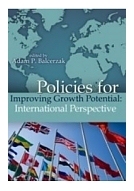|
||
• wydawnictwa polskie
• Zamów informacje o nowościach z wybranego tematu • kontakt
• Cookies na stronie |
POLICIES FOR IMPROVING GROWTH POTENTIAL OF ECONOMYBALCERZAK A.P. ED. - INTERNATIONAL PERSPECTIVEwydawnictwo: UMK , rok wydania 2010, wydanie Icena netto: Policies for Improving Growth Potential of Economy. International PerspectiveThis book is the result of collaborative research efforts of scholars interested in multivariate determinants of growth.Today most economists and market analysts concentrate on the consequences of global financial instability in the years 2008-2010. They try to find quick policy responses to the crisis, which unfortunately usually have short term character. However, it must be remembered that concentrating only on current problems and losing long term perspective can result in implementing ideas and policies that lead to decreasing international competitiveness, limiting innovativeness and destroying long term grow potential of economy.Thus, it means decreasing overall welfare of society. This book can be considered as a consequence of belief that the issue of determinants of growth potential is never over-researched area, especially in case of countries that have to deal with serious current consequences of global economic instability, and at the same time face long term problems of obtaining high speed of real convergence. As a result, the aim of the book is to shed lights on multidimensional aspects of policies supporting growth potential and factors restricting their effectiveness. The analysis is mostly based on experiences of developing countries.Acknowledgments / 7 Ewa Kosińska, The Public Sector as a Component of a Contemporary Economy
/ 19 Michał Moszyński, Labour Market Regulation and the Economic Growth in the
Developed Countries / 131 Monika Golonka, The Determinants of International Competitiveness. West Versus
East / 255 340 pages, Paperback Księgarnia nie działa. Nie odpowiadamy na pytania i nie realizujemy zamówien. Do odwolania !. |


